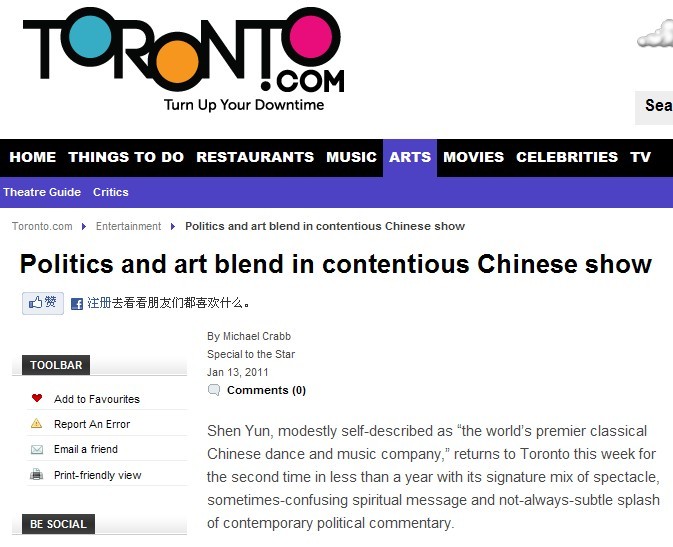Shen Yun, modestly self-described as “the world's premier classical Chinese dance and music company,” returns to Toronto this week for the second time in less than a year with its signature mix of spectacle, sometimes-confusing spiritual message and not-always-subtle splash of contemporary political commentary.
There are often as many as three Shen Yun companies performing simultaneously in different locations and troupes have toured globally to some of the most illustrious performance venues. One place the company is not welcome is the very country whose ancient cultural and spiritual heritage it seeks to celebrate, the People's Republic of China.
Shen Yun is the protégé of New York-based NTDTV (New Tang Dynasty Television), many of whose founders, staff and helpers either practise or sympathize with Falun Dafa, more popularly known as Falun Gong.
For those who have not witnessed its followers' outdoor exercises or accepted one of its leaflets, Falun Gong is a self-enlightenment movement of ancient Chinese origin, infamously banned by the nation's communist government in 1999 — after several years of sanctioned existence — and subsequently suppressed as a heretical cult.
The Falun Dafa Association of Toronto is one of Shen Yun's local presenters. The current show is said to contain two sequences with direct reference to China's brutal treatment of Falun Gong.
Whatever one's stance toward well-documented abuses in China of what we uphold as inalienable human rights — and it's hard not to be appalled — the association of Shen Yun with a controversial movement, however officially arms-length it may purport to be from Falun Gong, has dogged the company. Politics have inevitably coloured the way professional critics — not the vox pop whose laudatory opinions lard its website — respond.
The less forgiving have denounced Shen Yun as propaganda masquerading as family entertainment. The more generous have responded enthusiastically to the quality of music, singing and dancing the company's lavishly costumed performances comprise.
On the basis of one exposure in 2008, I must confess a degree of disconcertment with Shen Yun's incongruous cocktail of traditional arts, spiritual admonitions and flashy Vegas-style production values. Nor was it particularly comfortable to watch the Falun Gong-referencing episodes without reflecting on some of movement founder “Master” Li Hongzhi's contentious pronouncements about science-based medicine, homosexuals and mixed-race mating.
The Star gave the troupe a negative review following a January 2008 performance. For this story, Shen Yun's presenters declined an interview; nor was a media invitation extended to review the performance. The Sony Centre, like most of the venues where Shen Yun performs, is functioning purely as a rental facility — at a good deal more than arms length.
According to its website, the three moral pillars of Falun Dafa are truthfulness, benevolence and forbearance. Critics, in my experience, aspire to the first, generally tend toward the second but are not afraid to eschew the third when to do otherwise would defeat the first.
To those many who will rightly choose to see this performance with its political overtones, do so, I would urge, with an open but not supine mind. There is a long history of politically activist art. The issue is how deftly politics and art are blended. Misjudge the balance and you defeat both objectives.

Original text from: http://www.toronto.com/article/669031--politics-and-art-blend-in-contentious-chinese-show
(Toronto.com, Jan 13, 2011)